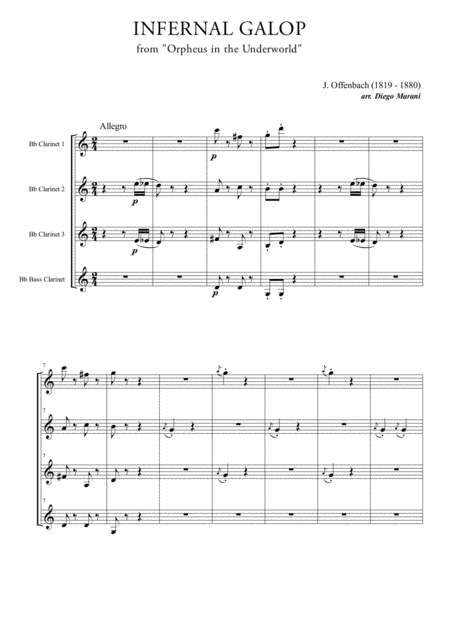Woodwind Ensemble,Woodwind Quartet Clarinet - Level 3 - Digital Download SKU: A0.527617 Composed by Jacques Offenbach. Arranged by Diego Marani. Classical,Holiday,Instructional,Opera,Standards. 19 pages. Diego Marani #3029389. Published by Diego Marani (A0.527617). Orphée aux enfers, whose title translates from the French as Orpheus in the Underworld, is an opéra bouffe (a form of operetta), or opéra féerie in its revised version. Its score was composed by Jacques Offenbach to a French text written by Ludovic Halévy and later revised by Hector-Jonathan Crémieux.The work, first performed in 1858, is said to be the first classical full-length operetta. Offenbach's earlier operettas were small-scale one-act works, since the law in France did not allow full-length works of certain genres. Orpheus was not only longer, but more musically adventurous than Offenbach's earlier pieces.This also marked the first time that Offenbach used Greek mythology as a background for one of his pieces. The operetta is an irreverent parody and scathing satire on Gluck and his Orfeo ed Euridice and culminates in the risqué Galop infernal (Infernal Galop) that shocked some in the audience at the premiere. Other targets of satire, as would become typical in Offenbach's burlesques, are the stilted performances of classical drama at the Comédie-Française and the scandals in society and politics of the Second French Empire.The Infernal Galop from Act 2, Scene 2, is famous outside classical circles as the music for the can-can (to the extent that the tune is widely, but erroneously, called can-can).This arrangement for clarinet quartet includes the following parts: Bb Clarinet 1 or Eb Clarinet, Bb Clarinet 2, Bb Clarinet 3 or Eb Alto Clarinet, Bb Bass Clarinet.
